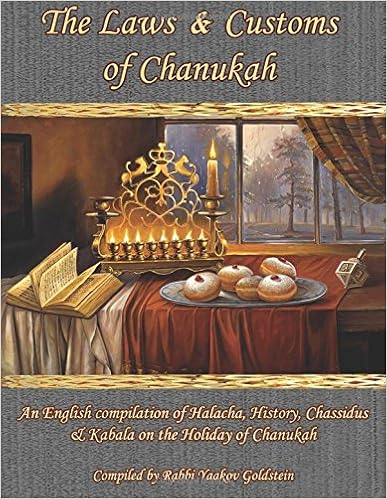
To purchase this Sefer, click here
Aveilus:[1]
The laws of Aveilus apply on Chanukah just as the rest of the year.
Hesped: [2] One may not recite a eulogy during Chanukah unless the person is a Torah Sage, and his body is present [i.e. prior to burial[3]] at the time of the Hesped. [Some Poskim[4] rule it is forbidden to eulogize on Erev Chanukah, starting from midday. Other Poskim[5] however rule it is permitted to eulogize and say Tziduk Hadin on Erev Chanukah, even past midday.]
Tziduk Hadin:[6] One does not recite Tziduk Hadin on Chanukah. [It may be recited on the days preceding Chanukah, or directly after Chanukah.[7]]
Onen:[8] The laws of Aninus apply on Chanukah just as they apply the rest of the year. An Onen is exempt from lighting Chanukah candles.[9] Some Poskim[10], however, rule that his wife [or other household member[11]] is to light the candles in his stead. It is however forbidden for him to answer Amen to her blessing.[12] Some Poskim[13], however, rule that he is to answer Amen to her blessing. If no one is available to light in his stead, he is to light the candles himself without a blessing.[14] [If the burial took place at night, then if it took place past a half hour after nightfall, some Poskim[15] rule he may no longer light that night with a blessing.[16]]
Seudas Havrah:[17] The Seudas Havrah which customarily takes place following the burial is likewise to be eaten during Chanukah, after the burial.
_________________________________________
[1] Elya Raba 670:19; M”B 670:12; Kaf Hachaim 670:20
[2] Michaber 670:3; Rava Moed Katan 27
[3] See Admur 429:8 [based on Rambam Yom Tov 6:22 and Avel 11:5] that the definition of “present” is “prior to the burial”, and implies that even if the body is not present, a eulogy may be given prior to the burial. So is also implied from Michaber Y.D. 401:5 who equates even a Shemua Rechoka to Befanav!
[4] Rama 420:2 regarding Erev Shabbos after midday, and the same would apply to Erev Rosh Chodesh being Tachanun is omitted starting from midday; P”M 420 A”A 1 that so is custom of Prague and other cities; Maareh Kohen Y.D. 401:2
[5] Shach Y.D. 401:2; Beir Heiytiv 401:1; Nitei Gavriel Aveilus 52:15
[6] Rama 420 regarding Rosh Chodesh, and the same applies on Chanukah [Rama 670:3]; Taz in 420; Yad Efraim; M”B 670:12
[7] M”B 670:12; Peri Megadim
[8] M”B 670:12
[9] M”B ibid
Other opinions: Some Poskim rule it is questionable whether an Onen is obligated in lighting candles, and hence if no one is available to light in his stead, he is to light without a blessing. [Erech Hashulchan 670:3; Kaf Hachaim 670:20; So brings also M”B ibid in name of P”M]
[10] Elya Raba 670:19; Erech Hashulchan 670:3; M”B ibid; Kaf Hachaim ibid; P”M 670 M”Z 4; Gesher Hachaim p. 171:16; Nitei Gavriel Aveilus 33:1
[11] See Derech Hachaim; Piskeiy Teshuvos 676:1 footnote 2
[12] Admur 71:1 “And he is exempt from all blessing, even from answering Amen, and it is Rabbinically forbidden for him to be stringent upon himself in this”; Michaber Y.D. 341:1 regarding all blessings; Maharam Shick Y.D. 342 that this law applies likewise towards Chanukah candles.
[13] Elya Raba 670:19; Kerem Shlomo Y.D. 342; Kaf Hachaim 670:20; Piskeiy Teshuvos 676:1; M”B 670:12 mentions a dispute in this matter, and does not give a final arbitration.
The reason: As this is a Mitzvah of Persumei Nissa.
[14] Erech Hashulchan 670:3; P”M 670 M”Z 4; Derech Hachaim; M”B ibid; Kaf Hachaim 670:20
[15] Shut Magidos 2:163
[16] The reason: As the main institution of lighting candles is from sunset until a half hour after nightfall. Past this time, the lighting is a mere act of Tashlumin. [P”M ibid; See Ravaya 972; Admur 71:1]
[17] Kaf Hachaim 670:19


Leave A Comment?
You must be logged in to post a comment.